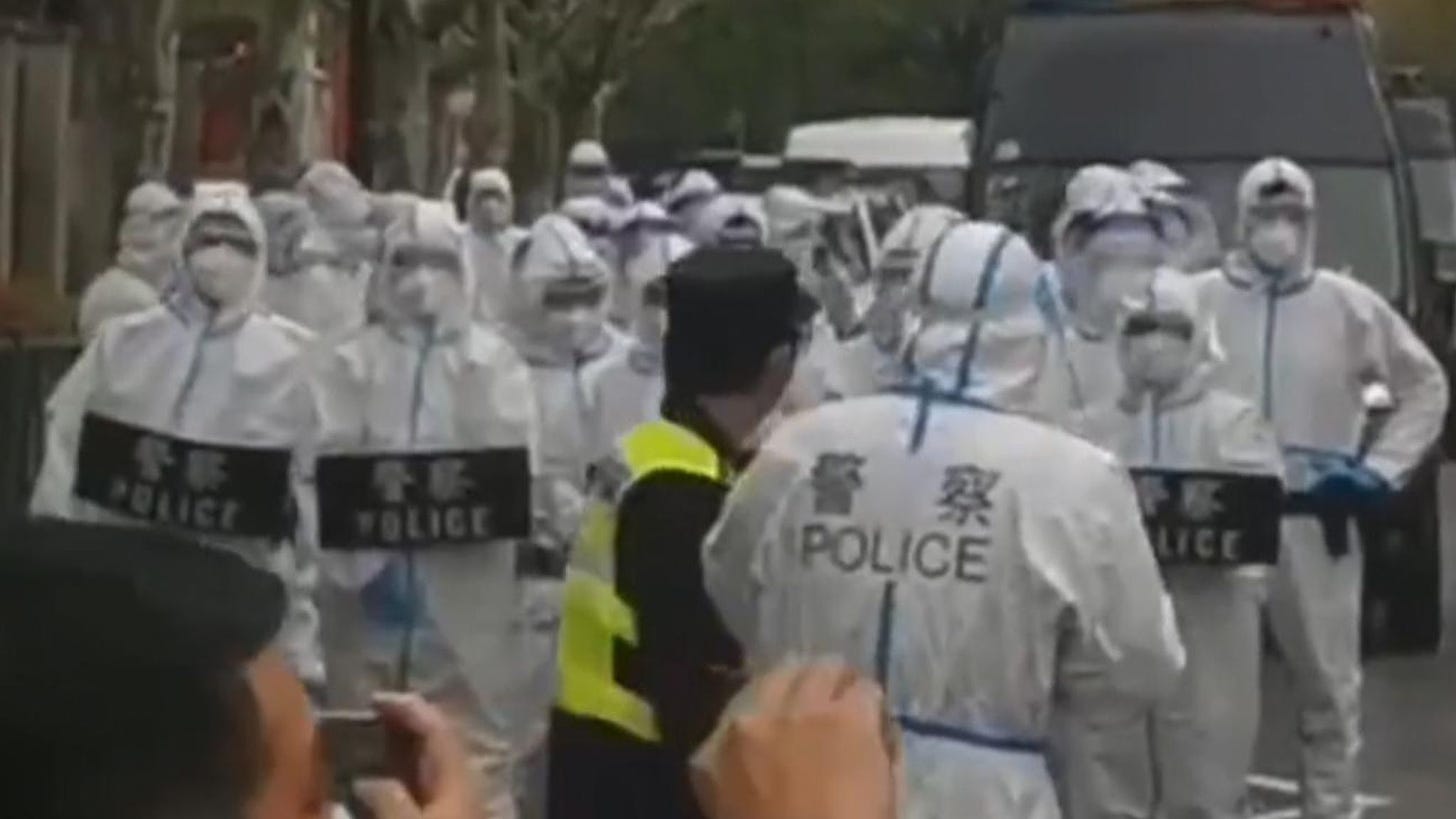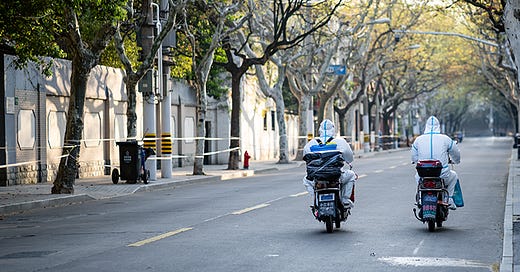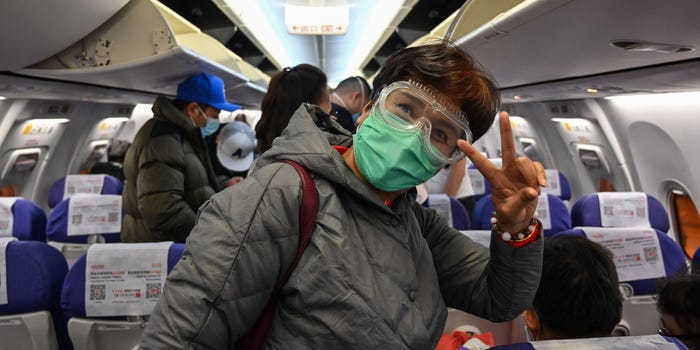Inside Shanghai: Questions, Lessons and Silver Linings
Plus a Chinese take on travel in the Covid era
As the lockdown in Shanghai continues, in this post we’re sharing two personal essays from ChinaTalk readers on their lockdown experiences.
Community in the Xiaoqu
By Philip Róin, China reporter for Danmarks Radio. Check him out on Twitter @brandhane.
Even from the onset of the 2022 Shanghai lockdown, it didn’t make much sense to lock down Shanghai at the xiaoqu (or compound) level. In a big city like Shanghai with millions of migrants and a hurry of people constantly on the move, you don’t really interact that much with your immediate neighbors.
True, the old folks chatting and playing cards and mahjong on the street do intermingle, but it’s the white-collar working class that hurries around the city for yoga and coffees that are the real potential virus carriers.
If one omicron-infected person frequented one of those too-close-for-comfort bars, then consider everyone doomed. The xiaoqu lockdowns were a leftover from the grid strategy that has since been deemed a failure.
Yet everything in Shanghai life over the past two weeks has been defined by your xiaoqu. If one had a case in his xiaoqu in the month leading into April, they probably got slapped with a 7+7 quarantine notice and by now might have been under lockdown for four consecutive weeks.
My friend in Pudong is on his fifth week because there was a single case in a xiaoqu with thousands of people.
It’s easy to lock down a Shanghai xiaoqu. Most have two to three gates meant to keep people out. With a chain lock and a security guard to watch over it, you’ve effectively locked hundreds, if not thousands, of people inside.
As such, your xiaoqu has been your lifeline for the past two weeks. Group buys, testing, government food deliveries, fun, and community have all come down to who is around you. Those neighbors in your xiaoqu that you never really hung around that much with are now your one and all.
If it wasn’t for Epermarket’s delivery of 550 kuai survival packages, people who don’t speak Chinese and can’t do group buys would’ve starved by now.
This is also to say that the pain of this lockdown has been highly unequally distributed. All lockdowns are unequal, but it appears especially so in a city like Shanghai that relies so heavily on the backbreaking work of millions of lowly paid migrant laborers, who scurry goods and services around the city for the above-mentioned white-collar class.
I feel cramped in my forty-square-meter apartment, but I know that four stories below, three delivery drivers are sharing a room with a bathroom and a kitchen in the staircase; and they have been horizontal for two weeks, counting, starring at Kuaishou, and smoking.
If your xiaoqu is the Panyu Mansion in Xuhui, you’ve even been invited for a window-side concert with a lackluster lineup but plenty of bravado including the warning: 都是邻居不要举报 (all are neighbors, don’t report).
Mistrust saved you, barely
If you believed that there wouldn’t be a lockdown due to the government saying it was a rumor and subsequently sending out a warrant for the capture of the rumor mongers - and you then believed that the rumored lockdown would only last the stated five days - you’re in a pretty bad place right now.
There’s direct causation between your mistrust in government and how much you stocked up. Take my friend in Baoshan, who lives with his kid in a cramped apartment. He thinks that a new Great Leap Forward is right around the corner and is stocked up for three weeks. But he’s been holed up for five and even his family is struggling.
People suspicious of the government stocked up for two or three weeks, but plenty of people are now well into their fourth or fifth. With group buys, better delivery, and sporadic-at-best government handouts, people are staying fed, but the lack of control of your food destiny makes people very uncomfortable. Baoshan-friend is furious with himself. Trusting his government even less is his lesson going out of this lockdown.
All of us that were wired up on Weibo and hundreds of rumor-spreading WeChat groups knew this was coming. The folks who get their news from state radio and television were blindsided.
It was they, the old folks primarily, that were in the queues snaking around the corners in the three days we had to prepare here in Puxi. It was they who saw the produce prices double while mistrusting the Weibo crowd who had stocked five kilos of chickpeas.
I enjoy putting ChinaTalk together. I hope you find it interesting and am delighted that it goes out free to eight thousand readers.
But, assembling all this material takes a lot of work, and I pay my contributors and editor. Right now, less than 1% of its readers support ChinaTalk financially.
If you appreciate the content, please consider signing up for a paying subscription. You will be supporting the mission of bringing forward analysis driven by Chinese-language sources and elevating the next generation of analysts, all the while earning some priceless karma and access to an ad-free feed!
The propaganda is annoying when it’s directed at you
Every time there’s been a lockdown of a major city for the past year, we’ve seen the same chic video: a drone flying above deserted streets with some Interstellar music and some faint “加油” (“jia you”) yelled out.

Well, it’s easy to encourage people to stay motivated and follow the rules, it’s less fun to be on the receiving end.
Those in power are masters of propaganda during peacetime but when things go south they struggle. Instead, they resort to censorship and hope that no one notices.
It’s difficult this time because it’s Shanghai. The Shanghainese, a people that pride themselves on having better governance and bureaucrats, weren’t able to get a truck into the city for four days. So, when the propaganda faced off with the stark reality on the ground, the former fell short.
For example, when an official claimed on livestream that Shanghainese had no trouble getting food, a comment asking the said official to try buying groceries on the spot garnered 20k likes. The comment section was later turned off.
To quote the notorious fuerdai (a child of the nouveau riche, in this case, Wang Jianlin’s son) Wang Sicong, who isn’t generally a source of inspirational quotes: “When people starve in the 21st century, it is due to the failure of a government.”
And this is coming from the guy that bought iPhones (plural) for his dog.
A screengrab from Weibo even praised the BBC’s coverage of the lockdown. People called it “true” and “accurate.”
People are pissed
The story that made it into the news outside of China was the yelling from the balconies because it was a medium of protest western viewers could fathom.
But WeChat groups and Weibo have been seething for weeks well before that. Even my old colleague who would yell propaganda slogans at me whenever I had a complaint about inefficiency in the system has been scolding the government, the party, and everyone in between.
Splitting children from parents, building inadequate and redundant quarantine facilities, testing obsessively without logic, and the absolute incompetent absurdity of locking in 26 million people without a plan for food delivery feel like just the tip of the iceberg.

After Dr Li Wenliang died in 2020, people were angry, but they were also scared. This time they are just angry. “I don’t fear the virus, I fear the government’s control,” a friend said. Once this is over, there will be endless misery and government incompetence to uncover, and hopefully, but probably not, Chinese media will have some leeway to tell the story.
Silver linings
Because we’ve been spared from the misery of covid here in China for the past two years, there haven’t experienced the social changes that we’ve seen elsewhere.
Working from home never became a thing for the average office worker, the Great Resignation never happened, and people didn’t get a good chance to reevaluate their priorities.
The neijuan (society becoming more and more of a rat race) continued, unabated by what happened outside China.
Maybe this will change after this lockdown misery. Maybe the overworked aspiring middle-class will find their voices or leave to find something better. Maybe the work and efforts of the unnamed couriers will be valued monetarily and societally in a manner they’ve long deserved.
The birth of a real community spirit in the lockdown neighborhoods is real, and hopefully real enough to stay real after we’re released.
Big Chinese cities can be alienating places for outsiders and insiders alike. We’ve had to rely on each other to secure food and preserve sanity, and most xiaoqu will be better for it in the end.
The savvy xiaoqu-organizers have become beacons of competency and received warranted praise across the city. The group buy-lad in charge of beverages in my xiaoqu has a response time of 10 seconds at all hours of the day and thanks to him we no longer need to drink boiled tap water.
This lockdown has been overseen by thousands and thousands of volunteers that have toiled harder and longer than anyone could’ve expected. My ex-boss, a multi-millionaire, has been unloading group buy orders in his xiaoqu.
When I asked to interview one of the dabai (anti-epidemic workers) on video about his work, he rejected me because he didn’t want to be seen as just a dabai but as a person. Alas, he also refused to be featured on video in civilian attire and eventually also the audio interview.
But the rationale was real: “I, we, are not just white suits with authority, we’re people that volunteered to help our communities and the city.”
Travel in the Covid Era, Shanghai misinformation, and positive quotas
By Zhao Xiaoou, currently a Student (at University of Zurich) Check him out on Twitter @zhaoxo.
I’m writing this article knowing that I have a 7 am flight to catch tomorrow morning. International travel has long been a luxury for most of my fellow Chinese compatriots. It is the case even more so now. Long quarantine awaits them if they have to go abroad, and local police do their bit by issuing as few new passports as they can.
There are stories of border guards tearing up the passports of people who wanted to visit their sick relatives abroad.
But we have also experienced a false dawn for the Chinese aviation industry. From mid-2020, almost every Chinese airline offered a kind of “all you can fly” deal to anyone willing to chalk up a low-to-mid four-figure sum for the privilege.
Hongqiao and Pudong in Shanghai were, for the better part of a year, where my Saturdays began and Sundays ended. I went as far afield as Chongqing, and as close to home as Jinan and Fuzhou.
And while tickets over the weekend to the most popular tourist spots, such as Lhasa, Sanya, and Guilin, were almost impossible to book due to limits placed by China Eastern for this new class of frequent flyers, I also went back to my hometown of Changsha as frequently as possible to see my parents, too.
We know it is now impossible to go anywhere from Shanghai, and indeed many other Chinese cities. My friends are left pondering what “friend with connections” senior Alibaba executive Jia Yangqing had to secure him a flight from Pudong to San Francisco in the middle of the night.
But, to badly paraphrase Xu Zhimo in his eternal poem On Leaving Cambridge, they cannot ponder, as they are struggling with things more existential than traveling.
A friend has left a WeChat group chat I keep for my closest contacts due to the constant and dispelling news that continues to prop up. Another friend working for a state-owned media outlet is struggling to keep his spouse from boiling over.
His main message has been anger over the slippage (read: total collapse) of professional standards in his “brother working units.” As I write this paragraph, Xinwen Lianbo, CCTV’s flagship news program, has read out a segment about there being “sufficient provision for Shanghai.”
Netizens talk about having experienced an extra fast supply delivery before a visit by senior officials to their compound or participating in photo-ops where the same chunk of food is filmed at the community gate but quickly withdrawn for pictures at the next location.
They highlight empty shelves in stills of the coverage. A PR man points out the news was by no means trying to cover the full picture using partial cuts.
A photographer came out claiming he filmed part of the coverage at an RT-Mart in Yangpu district featuring well-stocked shelves not on April 17, when the news was broadcast, but on March 31 - and for CCTV2, not CCTV1, where it aired.
I have WeChat friends who are now praying for him, just as they were for the lyricists who refused to authorize the usage of their song by Shanghai TV’s ill-fated virus-fighting gala, which took place as the whole city struggled under stringent lockdown measures.
Food donated by other provinces was sold for hefty prices by street-level officials. The joke has been that the “exchange rate” between one real RMB and one “Shanghai RMB” is anywhere between three and 50.
I would be amiss if I didn’t mention the upcoming emigration wave. The search term “emigration” has been 20 times more popular than usual. Some of my expat friends in Shanghai are openly searching for opportunities abroad. Quite a few of them did so at the urging of their (Chinese) other half.
The US consulate has ordered its non-essential staff and the families of all staff to leave the country.
South Korean students at Fudan University, usually considered one of China’s Top Three institutions - and Shanghai’s best - is now headed by a career propaganda official whom many guess has higher ambitions.
Students asked the Korean Consulate to ask the University to release them from lockdown so they might return to Korea. The request was refused.
My friends, most of whom are quite young and therefore do not suffer from chronic diseases, have talked about going to all sorts of places after this is all over: Ningbo, Guangzhou, Singapore, and shores beyond.
My family is lucky to have not suffered so much. But I am advising friends in China to stock up and am stocking up for my parents in Changsha.
But recently a traveler from Guangzhou to Wuhan found out his health code became red after the train journey after passing Hunan. After several telephone inquiries, he managed to get the Hunan health authorities to turn his code back to green.
Asked why it went red, he was told: “We have a quota of 10 (positives) per day to fill.”
Have thoughts, comments or ideas you want to share about this week’s ChinaTalk? Leave your feedback in the comments!
Thanks for reading,
Jordan




